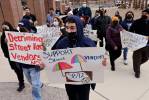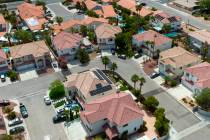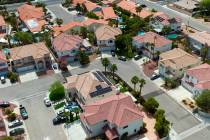Home resales decline in August
WASHINGTON — Resales of U.S. homes dropped 2.7 percent in August to a seasonally adjusted annual rate of 5.1 million, the first decline in five months, prompting the National Association of Realtors to again plead for more taxpayer subsidies for their business.
The August existing-home sales figures represent “a mild retreat from a very strong gain in July,” when sales rose 7.2 percent, said Lawrence Yun, chief economist for the real estate trade group, which reported the August sales figures on Thursday. The August sales pace was the second highest in 23 months, he said.
“We are very close to reaching the point of a self-sustaining recovery,” Yun said. He defined “self-sustaining recovery” as stable or rising prices, which would encourage buyers who are waiting for prices to bottom out before taking the plunge.
Las Vegas-based SalesTraq reported 4,001 existing home closings in August, a drop of 14.4 percent from 4,675 in July. That was the strongest month since September 2005, when 5,004 resales were recorded. August resales increased 27.7 percent from the same month a year ago.
Larry Murphy, president of SalesTraq, said it’s not essential to buy at the very bottom of the housing cycle, just near the bottom. The Las Vegas housing market, once overalued, is undervalued compared to the rest of the country, he said.
“What we see right now is an overcorrection, in my humble opinion,” Murphy said. “Again, this reinforces to me that Las Vegas is going through a recovery at an accelerated pace, six months ahead of the rest of the country.”
Against this backdrop, the association is still “lobbying very hard” for Congress to extend and expand the $8,000 tax credit for first-time home buyers, Yun said. Sales must be closed by Nov. 30 to qualify for the credit.
“It is perfectly clear that realtors are scared to death of the tax credit’s expiration,” wrote Dan Greeenhaus, chief economic strategist for Miller Tabak & Co., noting the phrase “tax credit” appears six times in the group’s press release.
First-time buyers accounted for about 30 percent of sales in July and August, Yun said.
Without an extension of the taxpayer subsidy, the housing market could fall into a “double-dip” downturn, Yun said, which would stall the economic recovery.
The housing market is also being propped up by the Federal Reserve’s purchases of nearly $1.5 trillion in mortgage-related securities, accounting for about 80 percent of the market. The Fed said Wednesday it would slow its purchases and end them by next March.
Inventories of unsold homes on the market declined by 10.8 percent to 3.62 million, representing an 8.5-month supply at the August sales pace, the lowest since April 2007.
The drop in inventories was much larger than the historic norm for August, the trade group said. The inventory figures are not seasonally adjusted.
SalesTraq shows a 2.9-month supply in Las Vegas based on 11,356 available homes on the Multiple Listing Service and 3,682 monthly sales by Realtors.
“There is a growing pipeline of foreclosures that have yet to hit the market,” said Omair Sharif, an economist for RBS Securities, pointing to a report in The Wall Street Journal that banks have not yet begun to foreclose on 1.2 million homes that are severely delinquent.
Most economists did not expect a decline in sales. The median forecast by economists surveyed by MarketWatch was for a small gain, to a 5.40 million annual rate from 5.24 million in July.
Sales as tracked by the NAR are up 13.6 percent from January’s bottom, and are up 3.4 percent compared with a year ago.
Distressed sales, such as foreclosures or short sales, accounted for about 31 percent of sales in August, the same proportion as in July. Most analysts expect foreclosures to continue rising into 2010, with the unemployment rate yet to peak, and millions of homeowners with interest-only mortgages facing much higher monthly payments.
Review-Journal writer Hubble Smith contributed to this report.


















